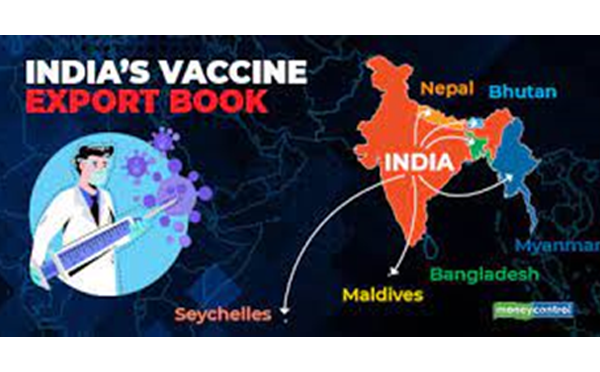Vaccine diplomacy: India’s bid for global influence
Posted on : March 29, 2021Author : Anvesha Pandey

The outbreak of novel Coronavirus (Coivd-19) in Wuhan, China followed by the proliferation of the highly infectious respiratory virus; transcending borders and finally shaping up has a global health crisis is unambiguously the most consequential epoch of the 21st Century. Affecting 208 countries, claiming more than 2.5 million lives, and infecting more than 110 million the pandemic has put healthcare machinery on its toes. As a measure to control its spread, national governments across the world advised strict quarantine and physical isolation, some even announced nationwide lockdowns. In the wake of an unforeseeable virus scourge, a state of complete economic and social disarray ensued worldwide.
In the surge to inhibit this virus; no human had the immunity against, an international scientific response was launched with the intent to understand its genetics, immuno-pathogenesis, and therapeutic strategies. Even though preventive and curative measures against coronavirus infections were being applied at full force, the most dependable solution is mass vaccination. Approaching this from an international diplomacy standpoint, having the formula and production means to currently most sought-after commodity in the world, would give a country an upper hand in the global power play. Consequently, many nations of the world ran a frantic race to develop the formula for a Covid vaccine. Eventually, the UK rolled out the AstraZeneca-Oxford vaccine; Russia’s Sputnik V vaccine and China’s Sinopharm and Sinovac vaccines begun global rollouts; The US, a US-Germany partnership produced vaccines made by Moderna and Pfizer/BioNTech respectively. India’s biotech company Bharat Biotech developed ‘Covaxin’.
The current theme of International diplomatic conversations is focused on procurement/deployment of vaccines i.e. vaccine diplomacy. While the West is struggling with large scale vaccine productions, China and Russia are eyeing this as an opportunity to extend their vaccine soft power by deploying a heavy quantity of doses across borders. Up until 19 February, the sole vaccination sources for about 21 countries were Russia, China and India. The Chinese vaccine has come under scrutiny for its inefficiency whilst China is already facing international condemnation for its role in the origin and spread of Covid-19. Additionally, a hurried and politicised rollout of the Russian vaccine has caused scepticism regarding its efficiency as well. Running neck to neck against these powerhouses in Asia, India has been able to carve out a special niche for itself in the Covid vaccine trade.
India is known as ‘the pharmacy of the world’ and the pandemic has posed both challenge and opportunity to this title. In 2020, Indian manufacturers were exporting a high quantity of the anti-malaria drug also used for the treatment of Coronavirus cases Hydroxychloroquine. By May 2020, India’s expenditure on pharmaceuticals, test kits, and other medical equipment for about 90 nations, was $16 million. Judging by the proactivity and productivity India is demonstrating in tackling the Covid crisis, it is conscious of the fact that by being the drug-maker the world needs right now serves more than one purpose- strengthening its soft power in South Asia whilst pushing back long mighty rival- China. As Peter Piot, director of the London School of Hygiene and Tropical Medicine, said during a vaccine symposium organized by the Indian government in July- without India, there won’t be enough vaccines to save the world. Home to the largest vaccine manufacturer in the world (Serum Institute of India), India has immense vaccine producing capability; manufacturing 62% of the world’s vaccine demands. With such assets at disposal and the ambition to gain political influence, PM Modi had initiated talks with world leaders about providing vaccines at an early stage.
UK’s AstraZeneca and Serum Institute of India (SII) announced a collaboration to supply one billion doses of the Oxford University vaccine candidate against Covid-19 to middle and low-income countries. The foreign ministry says India will undertake the task of supplying vaccines world-over after taking into consideration domestic necessities and international demands and obligations. By 20th January 2021, India began delivering free consignments of large doses of CoviShield vaccines to its neighbouring Asian countries as “gifts”, this also serves as a golden hour to reboot strained ties with some of its neighbours.
India and its Himalayan neighbour, Nepal hit a rocky patch due to the Kalapani boundary dispute—an area situated at the strategic China-Nepal-India trijunction, which strategically emerged at the critical time when India was engaged in a class with China on the Eastern Ladakh border, making evident Nepal’s pro-Beijing orientation. For the corona vaccine, however, Nepali PM Oli preferred Indian made shots over the Chinese vaccine. India sending out a million doses to Nepal might be a chance to improve ties with its civilizational twin. While the two nations have had co-operative and friendly relations in the past, India-Bangladesh relations seemed to go south as India passed the Citizenship Amendment Act (CAA); legislation that speeds up the process of attaining Indian citizenship for non-Muslims from three neighbouring nations including Bangladesh, further aggravated by the news of China’s committed $40 billion worth investments in Bangladesh. Bangladesh opted out of the deal with China as the latter made contributing to the clinical trial costs a necessary condition to buy its vaccine.
It was apt for India to fill the spot, sending two million doses of coronavirus vaccine to Dhaka as a gift. Bangladesh further struck a deal with SII to purchase 30 million doses of the vaccine. Sri Lanka too received 5, 00,000 doses as a token of friendship from India. It had put the Chinese vaccine on hold because it hadn’t completed its third trial yet and placed an order for 10 million doses of the AstraZeneca vaccine from the SII. India is united to Afghanistan by common nemesis Pakistan and has actively extended help and support the Taliban ravaged country. China had promised a donation of 200,000 doses to Afghanistan, but India was the first responder, delivering 5, 00,000 shots of Covid vaccines to the Afghans. Likewise, India reached out to Myanmar with a vaccine stock of 1.5 million before China could deliver the promised 300k doses. With hopes to garner stronger influence in the region, India reached out to Indian Ocean countries Maldives and Mauritius, with the gift of 1, 00,000 jabs of Covishield each. So far, New Delhi has managed to ship nearly 6.8 million free vaccines around the world while China has pledged around 3.9 million. India’s efforts of vaccine assistance are earning accolades and praises globally.
As India attempts to channelize its prowess as a pharmaceutical giant to strengthen its international relations, there are several domestic challenges on its path. India was the worst hit by the coronavirus, only behind the US with more than 10 million reported infections. There have been over 150,000 reported deaths from the disease. Pushed into months of nationwide lockdown, the economy has incurred massive losses, entering recession for the first time in 25 years. It has to walk on a tightrope trying to undo the loss of jobs, daily ration, and a social security net of individual citizens whilst playing a world leader. Most importantly, India has to execute the world’s largest vaccination drive. For that, it will need more than a billion doses to immunize its population which includes urban, rural and remote areas. All this simultaneous to acknowledging commercial agreements signed with the aforementioned nations beginning from March. Distrust and politics around indigenously made Bharat Biotech’s Covaxin, which will also be used along with Covishield, adds to the tension. Having controlled its cases and its economy registering positive growth, these are issues that direct competitor- China has long dealt with.
India’s outreaching vaccine policy is significant when juxtaposed with Western countries adhering to their policy of vaccine nationalism and buying more than required quantity supplies of vaccines, leaving behind the developing nations at complete lack of resources. This pandemic has been called an equalizer, in the sense that, majority of the world is under the scope of its impact. Ironically, it has also increased the visibility of the great divide between the developed and the developing nations. By manufacturing and deploying immunizations to countries desperately in need of them, India’s humanitarian role in the on-going Covid crisis can also be seen as a well harnessed diplomatic opportunity that is likely to materialize as growth in national power and influence in the new world order of the post-Covid world.
Anvesha Pandey
Intern Asia in Global Affairs





Leave a Reply